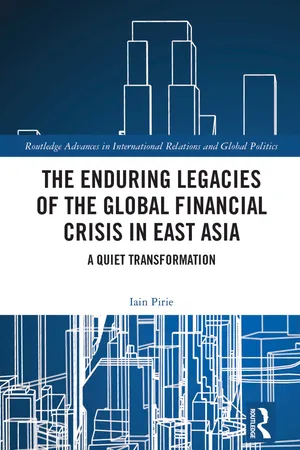
The Enduring Legacies of the Global Financial Crisis in East Asia
A Quiet Transformation
- 172 pages
- English
- ePUB (mobile friendly)
- Only available on web
About This Book
The Enduring Legacies of the Global Financial Crisis in East Asia challenges the assumption that the global financial crisis had a limited structural impact on East Asian political economies, arguing that the crisis has led to a significant, if uneven, reorganization of major national political economies within the region where, in response to the crisis, states have promoted domestic processes of financialization as a means of stimulating their economies.
The major East Asian economies, bar Japan, enjoyed strong recoveries from the 2008–2009 financial crisis. However, this success has been achieved by promoting domestic processes of financialization to maintain demand – more precisely, the rapid build-up of household debt (Malaysia, Korea, Taiwan, China) and asset price bubbles (China, Japan). In short, East Asia has employed precisely those practices that the global financial crisis itself illustrated the unsustainability of, to maintain growth. Using a post-Keynesian framework, the book argues that the dependency on these forms of financialization to support demand is a direct product of a failure to address the issue of inequality. High levels of inequality slow the growth of non-debt-based domestic consumption. An alternative approach to supporting demand in the post-crisis period would need to focus on progressive redistribution through strengthening of labour rights and systems of social support, which would directly challenge the interests of economic and political elites. The structural vulnerabilities that accelerated financialization is creating in East Asia demonstrate the necessity of a post-Keynesian growth strategy based on redistribution and curbing financialization. The book also argues that in certain Northeast Asian economies the crisis has led to a consolidation of systems of industrial activism/state control, which could have occurred without accelerated financialization, and vice versa.
This book will be of great interest to students and scholars of political economy and Asian studies.
Frequently asked questions
Information
Table of contents
- Cover
- Half Title
- Series
- Title
- Copyright
- Dedication
- Contents
- 1 East Asia and the Global Financial Crisis
- 2 The Global Economic Crisis
- 3 The Consequences of Global Economic Crisis: The Crisis that Changed Nothing?
- 4 East Asia and the Global Crisis
- 5 China and the Global Economic Crisis
- 6 Japan: The Thirty-Year Crisis
- 7 Korea and Taiwan: The Post-Developmental State and the Global Crisis
- 8 Malaysia: The Open Economy and the Global Crisis
- 9 Conclusion: East Asia between Two Crises
- References
- Index